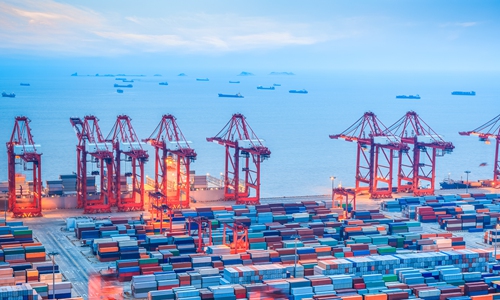World Bank report reaffirms China's standing as the world's largest developing economy
Source:Global Times Published: 2020/5/20 11:53:40

Yangshan deep water port in Shanghai Photo: IC
China is still the largest developing country in the world, as shown by latest World Bank report, the National Statistical Society of China (NSSC) said late on Tuesday.
The comment came after the International Comparison Program (ICP) 2017, released by the World Bank on Tuesday, revealed that China's GDP ranked first in the world based on purchasing power parity (PPP).
China's PPP-based GDP per capita was only 85.3 percent of the world average in 2017, ranking 90th globally, 11 places down from its global ranking in exchange rate-based GDP per capita.
"Obviously, there is a large gap compared to developed countries," the NSSC said in a statement posted on the website of China's National Bureau of Statistics.
The Chinese government has repeatedly stated that China is the world's largest developing nation, despite rapid economic growth for the past four decades.
China's PPP-based GDP in 2017 was $19.6 trillion, $7.5 trillion higher than its exchange rate-based GDP the same year, and 0.5 percent higher than that of the US, accounting for 16.4 percent of the $119.5 trillion total volume of all 176 economies.
The countries with the 10 highest PPP-based GDPs in 2017 were China, the US, India, Japan, Germany, Russia, the UK, Brazil, France and Indonesia. Developing economies gain an edge when GDP is calculated using the PPP-based method.
India's GDP rose from seventh place using the exchange rate method to the third place using the PPP method, and Indonesia from 16th to 10th.
The economies with the 10 highest PPP-based GDPs per capita in 2017 were Luxembourg, Qatar, Singapore, Ireland, Bermuda, the Cayman Islands, Switzerland, the United Arab Emirates, Norway and Brunei Darussalam, with an entry threshold of $60,282 per capita.
The NSSC noted that results for all economies are produced by regional implementing agencies and the World Bank, and are not produced by participating economies as part of the economies' official statistics.
It also stressed that due to the certain limitations existing in the ICP, its results should be used cautiously.
Posted in: ECONOMY